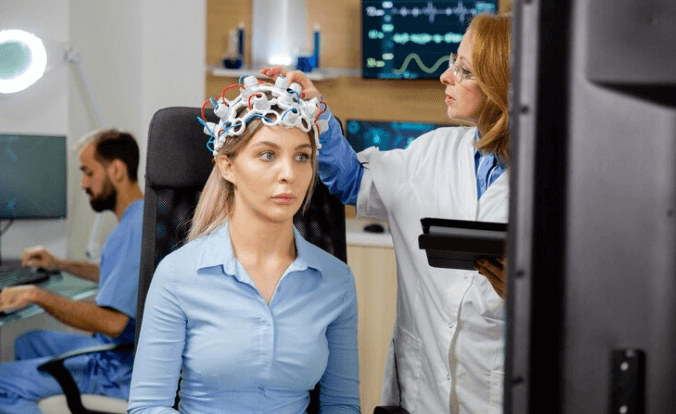EEG Test: How It Helps Diagnose Neurological Disorders
When doctors need to diagnose neurological disorders, they use different tests to understand what’s going wrong. One important test is the EEG (electroencephalogram), which tracks the brain’s electrical activity. This test is crucial for detecting conditions like epilepsy, sleep issues, and some mental health disorders. But what is an EEG test, and how does it help doctors accurately diagnose these conditions?
What is an EEG Test?
An EEG test works by attaching small electrodes to the scalp to monitor brain activity. These electrodes pick up electrical signals from the brain, which are then recorded by the EEG device. The test is simple, painless, and non-invasive, usually taking between 20 to 40 minutes, depending on the specific type of test. During the process, the patient may be asked to do certain activities, such as taking deep breaths or staring at a flashing light, to see how the brain responds.
How Does an EEG Test Help Diagnose Neurological Disorders?
The brain continuously sends electrical signals, and any disruptions in these signals may point to an underlying problem. For example, in conditions like epilepsy, unusual electrical activity in the brain triggers seizures. An EEG test can identify these abnormalities, helping doctors determine the type of seizure and decide on the appropriate treatment.
Here’s a real-life example: My friend Sarah had been dealing with unexplained bouts of confusion and occasional blackouts. After consulting multiple doctors, she was advised to undergo an EEG test. The test results revealed abnormal brain waves, leading to an epilepsy diagnosis. Thanks to the test, Sarah began her treatment promptly and has been seizure-free for years.
EEG tests are not limited to diagnosing epilepsy. They can also be used to identify sleep disorders such as sleep apnea, brain injuries, infections, and even mental health conditions like depression and anxiety. By examining the brain’s electrical patterns, doctors can spot issues that might have been missed otherwise.
EEG Test Price: What to Expect
If you’re considering an EEG test, you may be wondering about the cost. The EEG test price can vary depending on the location, the type of test (standard or prolonged), and whether it’s performed in a hospital or a private clinic. However, it’s always a good idea to check with the facility ahead of time to get an accurate estimate.
Some insurance policies may cover the cost of the test if it’s deemed medically necessary, so be sure to check with your insurance provider as well. In many cases, the benefits of an EEG test far outweigh the cost, especially when it comes to diagnosing and managing neurological conditions effectively.
Practical Advice for Patients
If your doctor recommends an EEG test, you might feel nervous or unsure about what to expect. The good news is that the procedure is simple and safe. Here are a few tips to help you prepare:
- Stay relaxed: Try to stay calm before and during the test. If you’re anxious, it might affect the results.
- Avoid caffeine: On the day of the test, avoid caffeinated drinks like coffee or tea, as they can affect brain activity.
- Follow the doctor’s instructions: Depending on the type of EEG, you might be asked to stay awake the night before or perform certain tasks during the test.
Also See- When Should You Consider a USG KUB Test
Conclusion
An EEG test is a vital tool in diagnosing and managing neurological disorders. Whether you’re dealing with epilepsy, sleep problems, or other brain-related conditions, this test can provide crucial insights. By understanding how an EEG works and what to expect, you can be better prepared if your doctor recommends one. Remember, the EEG test price is a small price to pay for the peace of mind that comes with understanding your health.














Post Comment